JIQS Newsletter 2016
President’s Message
 I use this medium to firstly congratulate the Jamaican Institute of Quantity Surveyors on another successful year. For 57 years this body has represented the best and brightest in our field and has epitomised professionalism and quality. Our organisation prides itself on being the voice for proper financial management of construction projects and has contributed significantly to the strides of the construction industry on a whole.
I use this medium to firstly congratulate the Jamaican Institute of Quantity Surveyors on another successful year. For 57 years this body has represented the best and brightest in our field and has epitomised professionalism and quality. Our organisation prides itself on being the voice for proper financial management of construction projects and has contributed significantly to the strides of the construction industry on a whole.
As I travel the length and breadth of Jamaica, it has become increasingly apparent to me of the need for professional and competent Quantity Surveyors to become active participants in the construction industry. Far too often individuals and companies alike learn too late what it means to the bottom line to eliminate the Quantity Surveyor from the construction process. We check the numbers; we toe the line; we keep it right.
The JIQS continues to embark on projects and to work with our industry partners to ensure that standards and best practices are
maintained. We continue to train members and non-members about the role of the quantity surveyor and the expectations of our job. We have visited schools island-wide to promote our profession and continue to advocate for formal recognition.
The “Know Your Rights Series” spearheaded by the JIQS has been a tremendous success. Here we inform persons in the industry, government representatives and persons from the general public about their rights and responsibilities as outlined in the Standard Form of Contracts. Thus far we have had 2 very successful seminars and we hope to have
the final one for the year in October.
Let me thank all members who have again contributed to the Quantity Surveyors’ Awareness Week (September 25 -30). Those of you who have organised, planned and prodded – the late hours and extra time are not in vain. The general public needs to be made aware of the great work that we do from behind the scenes and we hope that this will help them to understand us a little better.
I encourage us all to uphold the standards of our profession. Let us exercise due diligence, responsibility, and proper work ethic, so that we will be able to give sound and professional advice to our clients.
I look forward to your participation in the week’s activities as well as the other activities of the JIQS.
Markland Gordon – MJIQS, MRICS (President)
We are quantity surveyors:
Let’s save time and argument – accept that we are the experts in construction cost management / economics.
Know Your Rights – Dispute Resolution under the CIC Contract
Summary of presentation made by Mr. Dean Burrowes (BSc, MJIQS, MRICS, PG Dip Construction Law and Arbitration, Dip Construction Management) at the JIQS Workshop held on March 23, 2016

Mr. Dean Burrowes
Construction contracts are agreements between parties which bind them and impose obligations on the parties throughout the construction process. The Standard Forms of Contract proposes a distribution of the risks between the parties according to the ability of the party able to best bear it.
The Professional who is appointed to administer either of the contracts published by the Construction Industry Contracts, whether it is the Standard Form of Building Contract, private Edition with Quantities or the Agreement for Minor Works, must be acquainted with its obligations and the requirements of these contracts.
The UK Joint Contract Tribunal Contract 1963, on which The Standard Form of Building Contract is based, has been revised several times since 1963, the latest revision being 2011 and is now published using simpler language and also includes for:
- Collaborative working between the Parties.
- Health and Safety at Work regulations.
- Cost and Value improvement Claus-es.
- Environmental and Sustainable development requirements and
- Improved Notification and Negotiation of disputes requirements.
I have concluded that our local CIC contracts have not kept pace with the demands and sophistication of today’s Clients, therefore I am advocating for a comprehensive review of the CIC Construction Contracts to bring them in line with the demands of a modern clientele.
Both CIC contracts include similar mechanisms for the settlement of disputes, however, the requirements in each contract are different.
THE MINOR WORKS CONTRACT
The Minor Works Contract addresses disputes under Clause 8 and 8.1 and
states “If any dispute or difference of any kind whatsoever shall arise between the Employer and the Contractor at any time after execution of the contract, arising out of or in connection with this Agreement or the Construction Works, then such a dispute or difference shall be referred in writing, by either party, to and be settled by the Adjudicator”.
The clause also stipulates a time of 14 days for the Adjudicator to render his decision after having received the re-quest to settle any dispute between the parties.
The Adjudicator who is obligatory under this contract is able to use his knowledge of the law as well as his opinion and expertise in construction methods in arriving at his decision. He must however remain within the confines of the man-date as stated in the Notice of Adjudication, if not, his decision can be challenged as was ruled in the case (Jones v Sherwood Services. [1992] 1.W.L.R. 277.). The adjudicator’s decision is binding until the contract is Practically Com-plete or terminated. The decision may be challenged and referred to Arbitration by any of the parties by Notice issued within 14 days of the adjudicator’s decision being rendered.
Arbitration commences only after termination or Practical Completion and may be administered by one or three Arbitrators depending on the ability of the Parties to agree within 14 days of receiving a Notice to Arbitrate.
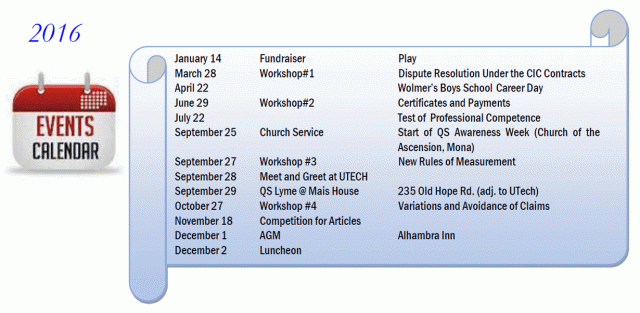
Worrisome Trends in the Tender Process
Having gotten more involved in the preparation of bids in recent times, I have begun to see some worrying trends in the way some entities and fellow professionals are going about obtaining tenders. Four areas of particular concern are:
- 1. The issuing of only one copy of the tender documents, in particular the bill of quantities (BQ), to each bidder.
- The refusal or reluctance to provide an electronic copy of the BQ that can be used for pricing.
- Insufficient time being given to tenderers to properly prepare their bid, and
- The reluctance to release the information from the bid opening exercise
For many years, local consultants in the construction sector, with responsibility for obtaining and evaluating bids and making recommendations as to the awarding of contracts, were guided by two documents the Code of Procedure for Selective Tendering (Building Works)
and the Code of Procedure for Selective Tendering (Civil Engineering Works).
In recent years the Government of Jamaica has issued its own guidelines for public sector procurement. While this is used exclusively on government projects, the two Codes of Procedures remain the standards for private work. Widespread use of the Codes would eliminate the deleterious practices that now seem to be creeping into everyday practice. These Codes can still be purchased from the JIQS and are a useful addition to the library of those involved in procurement.
1. Copies of Tender Documents
Where, in obtaining bids, BQs are provided to tenderers, the Code recommends that two (2) copies be provided to all bidders. If one can appreciate that since the Code was last revised (1999), the use of electronic documents have become more widespread, then the issuing of one hard copy and one electronic copy at this time should not be seen as unreasonable. The hard copy (a) provides a permanent record of what was given to the bidder to price (b) is used to make copies of sections to be sent out to suppliers and subcontractors for quotations, and (c) is used as a working copy by the estimator, in which pricing notes are made.
A problem arrises when only one hard copy is provided to bidders and they are given the unreasonable instruction that all prices must be hand written in the hard copy and returned by the deadline for submission; or that several copies of the priced document must be returned. It should not be the aim to make the tender process tedious, or to transfer the expenses of photocopying large documents to the bidders. Bidders already have the expense of paying to have the document priced and this can be a significant cost, which must be paid whether or not the bidder is successful.
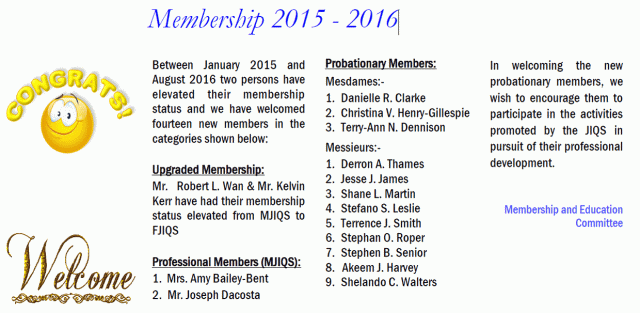

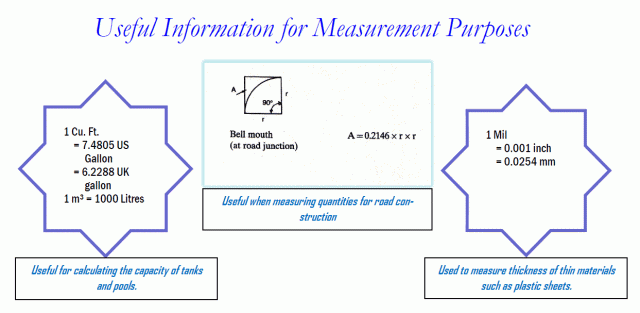
Rights
The Arbitrators decision is final and binding and will be upheld by the Courts , as was upheld in the case of Lloyd v Wright [1983] QBD.1065, Eveleigh L.J. in the Court of Appeal stated “ The court does not claim a monopoly in deciding disputes between parties. It does not of its own initiative seek to interfere when citizens have recourse to other tribunals”
Some omissions in the Minor Works Contract include: provision for the name of the Adjudicator (which is obligatory) to be entered; the method for delivering the Notice of Dissatisfaction with the Adjudicators decision not be-ing defined – one has to assume that it may be oral. There is also no direction regarding payment of the Adjudicator. The Governing law is not named — The Jamaican Arbitration Act 1900 is however assumed.
THE STANDARD FORM OF BUILDING CONTRACT, PRIVATE EDITION WITH QUANTITIES
The Standard Form of Building Contract, Private Edition with Quantities includes for dispute resolution under Clauses 37 and 38.
Adjudication is permitted under Clause 37, however this procedure is optional. Clause 37(a) also allows if either party is dissatisfied with the decision of the adjudicator they may at the end of the contract refer the dispute to Arbitration by the issuance of a written Notice of Arbitration. Facility to name the Adjudicator and Arbitrator is made in this contract.
The Arbitration procedure is similar as that proposed in the Minor Works Contract and must be conducted in accordance with the Jamaican Arbitration Act 1900. The arbitration procedure is analogous to court proceedings and adopts the courts Civil Procedure Rules. Arbitration is final being only subject to challenge in the Supreme Court if there is a disagreement on the points of law. As before stated, the courts will uphold the decision of the arbitrator. The case of Northern RHA v Derek Crouch [1984] Q.B.644 illustrates the court of Appeal restraint in overruling the powers of the Arbitrator. It held that the courts did not have the same powers as the arbitrator and interpreted the words “open up and review and revise any certificate” in the JCT contract to be a power exclusive to the arbitrator.
Unlike the adjudicator, the decision of the arbitrator is based on the evidence brought before him in the arbitration -nothing added or subtracted, his only requirement is that he ensures;
- Each party is given a fair opportunity to present his case and to be aware of his opponent’s case and to contradict that case.
- Absence of bias, and to act in good faith.
- He has no interest in the subject matter being heard or the outcome of the arbitration.
- He must be independent of the parties
The timelines for Arbitration are also more generous than that for Adjudication.
The absence of rules for the professionals practicing adjudication or arbitration in Jamaica have resulted in the reliance on the English practice set out in the 1996 Housing Grants Construction and Regeneration Act , and the Arbitration Rules 2000 Edition.
- Parties may be requested to supply documents as may reasonably be required by the adjudicator.
- The adjudicator may decide on the language of the adjudication.
- Meet and question any of the parties to the contract or their representatives.
- Visit the site (locus in quo).
- Carry out tests
- Hear advisors. However, both parties should be informed prior, (the adjudicator should not take credit for any advise provided by experts.)
- Set a timetable for the process.
Judgment’s of the adjudicator will be enforced by the courts. The case of Carillion Construction limited v Devonport Royal Dockyard {2005} EWCA Civ 1358 indicated that the Courts will recognize the adjudicator’s decision as enforceable and will only on rare occasions interfere with such decisions even if an error has occurred, see Bouygues v Dahl-Jensen {2000} B.L.R.522 (CA).
CONCLUSION
The matter of Dispute Resolution in construction contracts is one needing urgent attention, as it avoids adding cases to an overburdened courts system, when they can be settled be-tween the parties. Our immediate priorities should be to achieve the following:
- Rules for both Arbitration and Adjudication proceedings should be agreed and promulgated.
- Review and revise the Jamaican Arbitration Act 1900 to facilitate efficient local arbitration procedure and also to gain acceptance internationally.
- The need for a review of our Construction Contracts to bring them in line with modern requirements.
Dean Burrowes – MJIQS, MRICS
Association’s Dinner
| The Jamaican Institute of Quantity Surveyors hosted a Gala Dinner on December 5, 2015 at the Jamaica Pegasus Hotel. Guest speaker Mr. Richard Byles– President & CEO of Sagicor Group Jamaica Ltd., spoke on the topic: The Construction Sector & Economic Growth—The Way Forward. |  |
The occasion was also used to hon-or Mr. Brian Goldson (OD, FJIQS, FRICS, MCIArb.) with the award of ‘Life Member JIQS’, as well as to present awards to 8 quantity sur-veying firms that have been in busi-ness for 30 years or more. |
 |
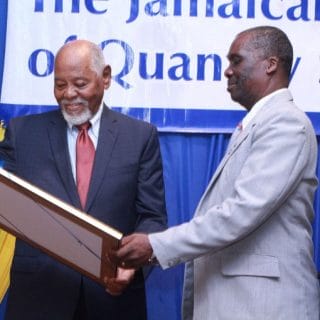 |
Certificates and Payments – Workshop
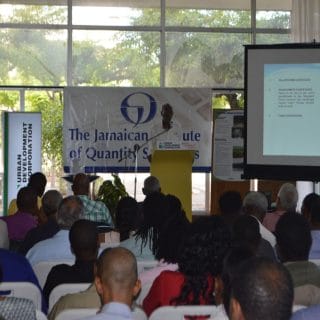
On June 29, 2016 the JIQS conducted a Work-shop titled “Certificates & Payments Under the CIC Contracts”. The Workshop was held at the UDC Information Centre and was attended by a wide cross section of persons from the construction industry.
Trends
Provide Electronic Copy of Blank BQ
There seems to be a fear amongst some project QS that, if they provide bidders with electronic copies of the tender document (usually in EXCEL format), bidders may modify the descriptions and/or quantities in order to gain an advantage over their competitors. To avoid this possibility, they have therefore decided not to provide any electronic BQ, irrespective of how huge the document to be priced may be. No amount of argument about the use of write-protected cells seem to hold sway with persons with this mind-set. Tenderers are therefore left with the arduous task of manually pricing documents, adding up each page, transferring numerous sub-totals to collections and summaries, not to mention the nightmare if they ever have to change or correct a rate or price.
One wonders what will happen when E-Tendering becomes standard in Jamaica, as is happening in some parts of the world. E-Tendering involves the dissemination of tender documents and the submission of bids in electronic format only, sometimes using specialized software.
Time Allotted for Preparing Bids
The Code recognizes that the time needed to prepare a proper bid will vary with the size and complexity of the pro-ject, but nevertheless recommends that a minimum of four (4) weeks be allowed. In some texts, even more time is rec-ommended as a minimum. I believe however, that there are cases where a two-week period will be sufficient, especially where there are only a few pages to be priced and written supplier’s or subcontractor’s quotes are not required. However, the standard practice for some persons seem to be to allow only two or three weeks, irrespective of the cir-cumstance. Practitioners need to understand that:
- In addition to carrying out their regular work, bidders may have several bids preparing within the same time frame.
- Where a written quote has to be obtained from a supplier or sub-contractor, it can take up to two weeks to get a response, as they may be busy preparing quotes for other projects. Some tenders require numerous quotes to be obtained, some from overseas suppliers and that can also add to the time, especially if clarification or additional details are required by the supplier.
- While the bid is prepared by the QS, it may have to be reviewed by the contractor, prior to submission, and
- Most prudent contractors like to get written quotes from their insurance provider and bonding agent and they can’t request a quote until they have a good idea of the tender figure. Time has to be allowed for these quotes, which in most contracts can be attached to the Basic Price List so as to allow the recovery of future increases.
Notification of Tender Results
The Code recommends that tenderers be advised as soon as possible of the various tender figures (in ascending order) and the list of tenderers (in alphabetical order). In fact, the Code states that “rapid notification of results of tendering should, therefore, be regarded as a public duty”. Too many QSs and clients now seem to believe that advising bidders of the result of a tender is a favour rather than an obligation. As a consequence, bidders are left to make numerous calls and to use back chan-nels in an attempt to get information that should be provided readily.
Those responsible for managing the tender process should aim for transparency. Delays in providing information usually leaves some believing that something underhand is taking place and that the result is being “cooked” or altered dishonestly. It must be appreciated that the information provided about the returned bid figures will inform the tenderers in the fine tuning of other bids that they are, or will be, preparing.
Owen Grant – FJIQS, FRICS
Appoint a Quantity Surveyor to your construction team today; it ensures best value for money
The Jamaican Institute of Quantity Surveyors (JIQS) is concerned with advancing the interests of the profession in general and the local quantity surveying fraternity in particular. The Institute works: to maintain the highest possible standards of professional ethics and practice, to encourage uniformity of practices and procedures, and to foster public faith in (and understanding of) quantity surveyors and their work.
Council Members 2016:
Executive:
President: Markland Gordon, Vice President: J’Vaughn Jacobs
Secretary: Shaniek Robinson, Treasurer: Ryon Edwards
Other Members:
| Dean Burrowes, Nichola Jaggon-Matthews, Milton Martin, Oneil Roper |
Shardon Haye, Richardo Lee, Michael Robinson, Woodrow Whiteley |
Shelley-Ann Irons, Shevene Logan, Leonard Smith |
Probationer’s Representative:
Michael Edwards
The Jamaican Institute of Quantity Surveyors Contacts
Postal./Delivery Address
12 Dumbarton Avenue
Kingston 10
Jamaica, W.I
Mailing Address
P.O. Box 52
Kingston 3
Jamaica, W.I
Phone
Secretary: Shaniek Robinson – (876)796-4064 / 920-8013 (fax)
Treasurer: Ryon Edwards – (876) 436-8287
Membership & Education Committee: Milton Martin – (876) 925-6014
Online
E-mail: jiqs@cwjamaica.com
Website: www.jiqs.com
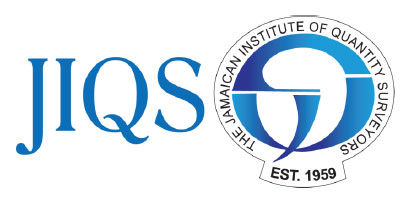 |
 |